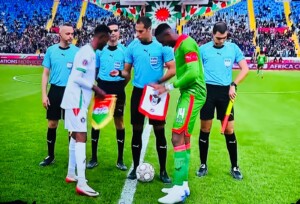Sudan Justice Minister clarifies repeal of strict laws
Justice Minister Nasreldin Abdelbari appeared on Sudan’s national television on Saturday to clarify why the government decided to repeal several strict laws on Friday.
 Minister of Justice Nasreldin Abdelbari (SUNA)
Minister of Justice Nasreldin Abdelbari (SUNA)
Justice Minister Nasreldin Abdelbari appeared on Sudan's national television on Saturday to clarify why the government decided to repeal several strict laws on Friday.
The amendments aim to align Sudan’s criminal laws with the 2019 Constitutional Document, that stipulates how Sudan will be governed during the 39-month transitional period, Abdelbari said. He stressed “the urgent need to establish freedoms and ensure the Rule of Law without discrimination”.
The Ministry of Justice has abolished apostasy as a capital offence, because it threatens the social peace by exposing people’s lives to danger. The article has been replaced with another article that does criminalise apostasy, but also demands that prosecutors protect those accused of apostasy.
The minister directed the police and immigration authorities to immediately implement the new amendments to the Personal Status Law that allow mothers to travel abroad with their children. In the past, mothers had to have written permission of the father – or, in his absence, one of his male family members – to be allowed to travel with their children to other countries.
The Information Law has been amended to reduce penalties for violations. Abdelbari stressed that the public prosecution must have means to confront rumours and false allegations.
Abdelbari affirmed that the recently passed amendments allow non-Muslims to drink alcohol. He stated that the law prohibits Muslims from doing the same. “We want to grant non-Muslims in Sudan their freedom and rights, as stipulated in the Constitutional Declaration.”
He said that the Miscellaneous Amendments Act does not aim to address the sale of alcohol and the opening of bars. “We leave these issues to discussions about Sudan’s future constitution. The fundamental amendments to the laws that we have adopted now, are linked to agreements made with the rebel movements during the peace talks in Juba. The old laws are a real challenge for the Sudanese. They should be broadly discussed in the future, by the people and by political parties.
“The amendments of the laws are related to the general policies of the government. The Ministry of Justice cannot go further,” he stated. “Drinking alcohol can be restricted again and the new amendment can be withdrawn later, if that is what the Sudanese want."
In the Al Bashir era, it was regarded prostitution if men and women where in a place where it was likely that they would have sex without being married. The new articles on prostitution punishes persons if they are found in a place that provides sexual services or is subject to repeated complaints about this.
The Minister of Justice further reported he presented the Sudanese government with options on dealing with the deposed leaders of the Al Bashir regime. They can be transferred to the International Criminal Court (ICC) in The Hague, an ICC court can try them in Sudan or in a third country, or they can be tried in Sudanese courts. He stressed the importance of retribution for the victims of the violence in Darfur, and said that he is in contact with the ICC.
Abdelbari announced the negotiations with the United States about Sudan’s responsibility for the Al Qaeda attack on the USS destroyer Cole in 2000 will be finished soon. A settlement will be reached with the families of the victims. This would allow Sudan to be removed of the list of countries that sponsor terrorism. This issue is almost solved, he said.
Earlier this year the Washington Post published a long read about Nasreldin Abdelbari, written by Rebecca Hamilton, that tells the story of his life as a young Furi in Darfur, his studies at the University of Khartoum and the USA, his academic career, and his sudden appointment as Minister of Justice.
Radio Dabanga’s editorial independence means that we can continue to provide factual updates about political developments to Sudanese and international actors, educate people about how to avoid outbreaks of infectious diseases, and provide a window to the world for those in all corners of Sudan. Support Radio Dabanga for as little as €2.50, the equivalent of a cup of coffee.












 and then
and then